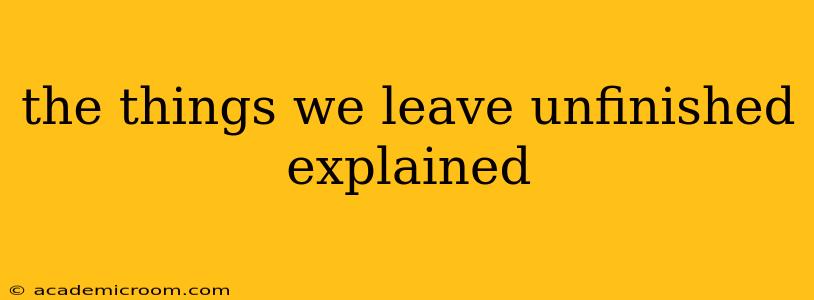Adam Kay's This Is Going to Hurt was a global phenomenon, brutally honest and hilariously dark in its depiction of life as a junior doctor. His follow-up, The Things We Leave Unfinished, takes a different, yet equally compelling, approach. It's not a memoir in the traditional sense, but rather a poignant exploration of unfinished business – both personal and professional – weaving together anecdotes, reflections, and insightful analysis of the human condition. This post will delve into the core themes of the book, addressing common questions and offering a deeper understanding of its impact.
What is The Things We Leave Unfinished about?
At its heart, The Things We Leave Unfinished is an exploration of regret, ambition, and the often-messy reality of life. Kay examines projects left undone, relationships unresolved, and dreams deferred, not just in his own life but through the lens of wider societal experiences. He skillfully intertwines personal narratives with historical context, weaving a tapestry of unfinished symphonies, abandoned buildings, and unresolved political conflicts. It's a reflective and introspective journey that prompts readers to confront their own unfinished business.
What are the main themes of the book?
Several overarching themes emerge throughout Kay's work:
-
Regret and Acceptance: The book tackles the universal human experience of regret – the things we wish we had done differently, said differently, or even simply started. However, Kay doesn't dwell solely on negativity. He subtly explores the process of accepting the past and finding peace in the present.
-
The Power of Imperfection: Kay challenges the societal pressure to achieve perfection, demonstrating that life often unfolds in unexpected, and sometimes incomplete, ways. The beauty, he suggests, lies in the journey itself, not solely in the destination.
-
The Weight of Unfinished Business: The book delves into the psychological burden of unfinished tasks, both large and small. Whether it's a half-written novel or a strained relationship, Kay highlights how these unresolved matters can cast a long shadow on our lives.
-
Finding Meaning in Imperfect Lives: Kay ultimately proposes that meaning is not found in the absence of incompleteness but rather in how we navigate and learn from it. This perspective offers comfort and a new lens through which to view life's inevitable imperfections.
What kind of projects does the book discuss?
Kay's exploration of unfinished business extends beyond personal experiences. He uses examples such as:
-
Uncompleted artistic works: He discusses the impact of unfinished masterpieces, exploring the mystery and intrigue they sometimes possess.
-
Political and social movements: He connects personal experiences with larger societal failures, highlighting the lasting consequences of unfinished political or social projects.
-
Personal relationships: He delves into the complexities of relationships and the ways in which unresolved conflicts can continue to affect our lives.
Is it similar to This Is Going to Hurt?
While both books are undeniably written by the same author and share a similar witty and engaging style, they are distinct works. This Is Going to Hurt is a visceral memoir focusing on Kay's experiences as a junior doctor, while The Things We Leave Unfinished is a more reflective and philosophical exploration of broader themes. Although infused with personal anecdotes, it's less focused on a specific timeline or career path.
Who should read The Things We Leave Unfinished?
This book appeals to a broad audience. Anyone who enjoys thoughtful, insightful, and well-written non-fiction will find it captivating. Its exploration of universal themes makes it relatable to readers from diverse backgrounds and life experiences. If you appreciated the honesty and humor of This Is Going to Hurt, you'll likely find this equally rewarding, though with a more introspective and less intensely personal focus.
Is it a hopeful book?
While acknowledging the weight of unfinished business and the sting of regret, The Things We Leave Unfinished ultimately offers a message of hope and acceptance. It’s not a self-help manual offering easy solutions, but rather a thoughtful exploration of the human condition, suggesting that finding meaning and peace is possible even amidst life's imperfections and unfulfilled ambitions. It's a book that encourages reflection, understanding, and ultimately, a more compassionate view of ourselves and the world around us.
